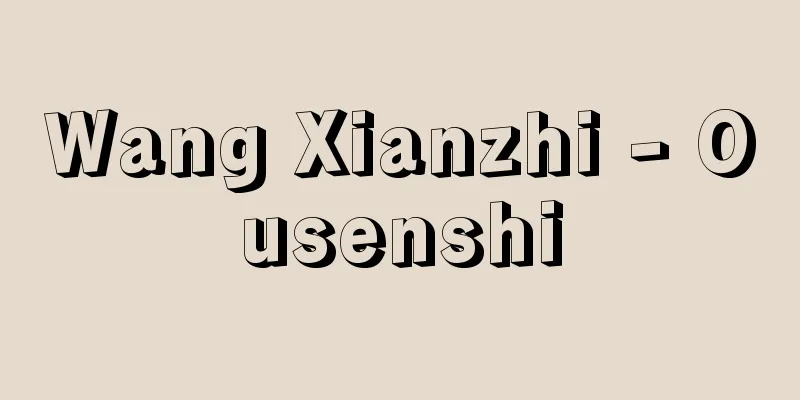Wang Xianzhi - Ousenshi

|
An early leader of the peasant rebellion (Huang Chao Rebellion) in the late Tang Dynasty in China. A native of Puzhou (Shandong) or Yangu (Shandong) of Caozhou. The salt monopoly policy in the latter half of the Tang Dynasty gave rise to a large number of smugglers of salt (private salt merchants), but in the mid-9th century, in response to the Tang Dynasty's strict control, they began to turn into bandits. Wang Xianzhi was known as a notorious bandit for being involved in private salt sales from early on, and in May 875 (or at the end of the previous year), he took advantage of the rebellions of feudal soldiers and fugitive peasants that were occurring all over the country and started a rebellion in Changyuan (Henan) with 3,000 people. He took over the two prefectures of Pu and Cao, plundered 15 prefectures in Henan, and gathered bandits from all over the country, including Huang Chao, to become a huge force of tens of thousands, shocking the Tang Dynasty. He then traveled around Hubei and Anhui, and arrived in Lizhou. In December 876, as part of a policy of appeasement by the Tang dynasty, he attempted to accept the position of Commander of the Left Shence Army and Censor-in-Chief, but was opposed by Huang Chao and others, and gave up. He then split off from Huang Chao and operated separately. There are no agreements about his final years, but one theory is that at the end of 877, he was invited by the Tang dynasty to send a subordinate, Shang Junchang, to Henan and Hubei, but was killed, and he launched another offensive, but was defeated by Huang Mei of Lizhou in February of the following year and beheaded. The remaining forces were led by Shang Junchang's younger brother Shang Rang, and joined Huang Chao's army to continue their activities. [Shuichi Kaneko] Source: Shogakukan Encyclopedia Nipponica About Encyclopedia Nipponica Information | Legend |
|
中国、唐末の農民反乱(黄巣(こうそう)の乱)の初期の指導者。濮州(ぼくしゅう)(山東)または曹州(そうしゅう)冤句(えんこう)(山東)の人。唐朝後半期の塩の専売政策は一方で塩の密売商人(私塩の徒)を多数発生させたが、唐朝の厳しい取締りに対抗して、彼らが群盗化する動きも9世紀なかばから顕著になった。王仙芝は早くから私塩に従事して名賊といわれ、各地に続発していた藩鎮(はんちん)兵士や逃亡農民の反乱に乗じて875年5月(または前年の末)衆3000人と長垣(ちょうえん)(河南)に乱を起こした。濮、曹2州を落とし、河南15州を略奪し、黄巣ら各地の群盗を集めて数万の大勢力となり、唐朝を震撼(しんかん)させた。ついで湖北、安徽(あんき)を回って蘄州(きしゅう)に達した翌876年12月、唐朝の懐柔策で左神策軍押牙(しんさくぐんおうが)兼監察御史(かんさつぎょし)の官を受けようとしたが、黄巣らの反発にあって断念し、以後、彼と二手に別れて行動した。末年については所伝が一致しないが、一説には、877年末、河南、湖北方面で唐朝の誘いを受けて派遣した部将尚君長(しょうくんちょう)を切られ、ふたたび攻勢に出たが、翌年2月蘄州黄梅(おうばい)に敗れて斬首(ざんしゅ)された。残余の勢力は尚君長の弟尚譲(しょうじょう)に率いられ、黄巣の軍に合流して活動した。 [金子修一] 出典 小学館 日本大百科全書(ニッポニカ)日本大百科全書(ニッポニカ)について 情報 | 凡例 |
Recommend
Rosary vine (English spelling) Rosaryvine
…It is an evergreen perennial climbing plant of t...
Women's Factory - Jokoba
In the early Meiji period, this mainly meant simpl...
Country Bushi - Inakabushi
1. Folk song. 2. In Kabuki dance, this refers to t...
Chitotsu
1158‐1210 A Korean monk from Goryeo, Korea, and th...
cord moss
…Hyotan-goke has been studied in detail from many...
News brief
…Originally the issue of passports was the prerog...
Envoy to Silla - Kenshiragishi
In ancient times, official envoys were sent from ...
Uranometria (English spelling)
...The Italian navigator A. Vespucci's book &...
Régnier, Henri (François Joseph) de
Born: December 28, 1864. Calvados, Honfleur [Died]...
sensitivity analysis
…It may also be necessary to examine how the opti...
Village Headman's Association - What is the mechanism?
In early modern Edo, this refers to the regional g...
Erythromycin
An antibiotic that is effective against gram-posit...
Duster
〘Noun〙 (duster)① A tool for sweeping away dirt and...
Passeriformes
...In Europe and India, the closely related house...
Engagement - Engagement (English spelling) French
Originally it meant a contract or a bond, but it ...









